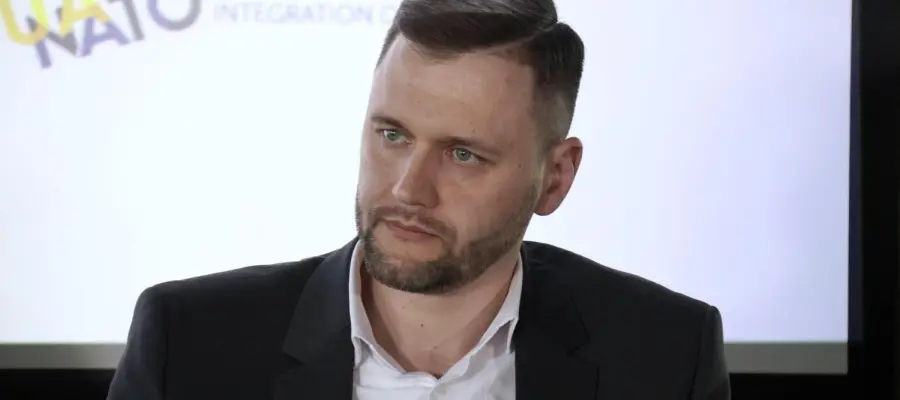
Despite a series of high-profile scandals, the government is determined to tackle dodgy dealings by officials as part of its EU accession talks.
Viktor Pavlushchyk, head of the agency in charge of tackling corruption, believes Ukraine is on the right path.
Tom Ball, Kyiv
Monday October 07 2024, 5.30pm, The Times
Tetiana Krupa had more money that she knew what to do with. When investigators raided the home of the provincial government official last week, they found bundles of cash worth nearly £5 million stuffed into every wardrobe and drawer. There was also half a million dollars inside two holdalls which Krupa, 64, threw out of the window in a half-hearted attempt at disposing of some of the evidence.
As head of a state medical centre in the region of Khmelnytskyi, western Ukraine, Krupa’s salary would have been no more than about £1,500 a month, leaving her with difficult questions as to how she managed to accrue so much cash as well as allegedly owning a property portfolio that includes holiday homes in Austria, Turkey and Spain.
She and her son have been charged with “illicit enrichment” as part of an investigation into false disability registration for men looking to evade military service, an area that would have come under Krupa’s purview.
The sheer scale of the alleged corruption and its apparent connection to draft-dodging have provoked shock and anger in Ukraine. But so too is there a sense of wearied resignation with the incident, just the latest in a series of high-profile corruption scandals that have been arising every few months.
It is a problem that spans every echelon of officialdom, from low-level functionaries such as Krupa to cabinet ministers and senior judges. In April, Mykola Solskyi, former minister for agriculture, was alleged to have illegally purchased state land worth millions of pounds, becoming the highest-ranking member of the government to be named as a suspect in a criminal case. Vsevolod Kniaziev, former head of the supreme court, stands accused of taking a bribe of more than £2 million. Both men maintain their innocence.
Rooting out corruption was the centrepiece of the presidential campaign that propelled Volodymyr Zelensky into office in 2019. Russia’s full-scale invasionof his country two years ago has made that task ever more pressing, with western allies demanding progress as they send tens of billions of dollars in aid and military supplies. In the US, concern over corruption was cited by Republicans as a reason for obstructing a $61 billion aid package, which was eventually voted through, though not before months of delay.
But to Viktor Pavlushchyk, head of the National Agency on Corruption Prevention (NACP), recurring scandals are not a discouragement but a positive sign that Ukraine is on the right track in its battle against corruption.
“If we look back ten years, who would have ever believed that the head of even a regional court could be accused of bribery, let alone someone as senior as Kniaziev,” he said during an interview at NACP’s headquarters in Kyiv. “But now people know that there is no impunity in Ukraine and anyone who commits bribery will be prosecuted.”
NACP was one of three anti-corruption agencies established in 2015, a year after President Yanukovych was ousted. Using embezzled state funds, the pro-Russian former leader built a palace on the outskirts of Kyiv complete with a private zoo, boxing ring and a white Steinway piano signed by John Lennon. He and his cronies are estimated to have stolen £28 billion from the state.
Appointed to the role earlier this year, Pavlushchyk is responsible for the roll-out of the state anti-corruption programme, a compendium of more than 1,000 measures signed off by the government last year. Once all the measures are implemented, the programme is expected to save the state £4 billion a year lost to corruption. So far more than 25 per cent have been put in place.
Among the measures are efforts to strengthen checks on government officials’ expenditure as compared with their income, a process known as “lifestyle monitoring”. It was through this that NACP, with help from journalists, was able to build a case against Yevhen Borysov, an enlistment officer in Odesa accused of buying a villa in Marbella using £3.8 million in kickbacks. He is awaiting trial.
As EU accession talks get under way, enactment of the programme is one of the markers by which Ukraine’s anti-corruption reforms will be judged by the bloc. Last month, Pavlushchyk travelled to Brussels where he presented a report to the EU commission on the programme’s progress and the compliance of Ukrainian legislation with the bloc’s.
Tetiana Shevchuk of the Anti-Corruption Action Centre, a non-governmental organisation based in Kyiv, believes that the accession talks will help to provide some of the political impetus needed to speed along new measures.
“While we think that there has been some good progress, it has not always been that quick,” she said, highlighting the judiciary in particular as an area where reform has been slow. “Particularly since the full-scale invasion, society reacts very strongly to any form of injustice, so there is a very low tolerance for corruption and high demand for change. The government knows it has no option but to act.”
Pavlushchyk notes the scale of the task, pointing out the fact that Ukraine is the only country to harmonise its laws with the EU’s while fighting a war. But so too has war itself provided an impetus for change, uniting society around a common goal of creating “a better country for those serving on the front lines to come back to”.
“Ukraine is fighting two wars, one against Russia and the other against corruption,” he said.



